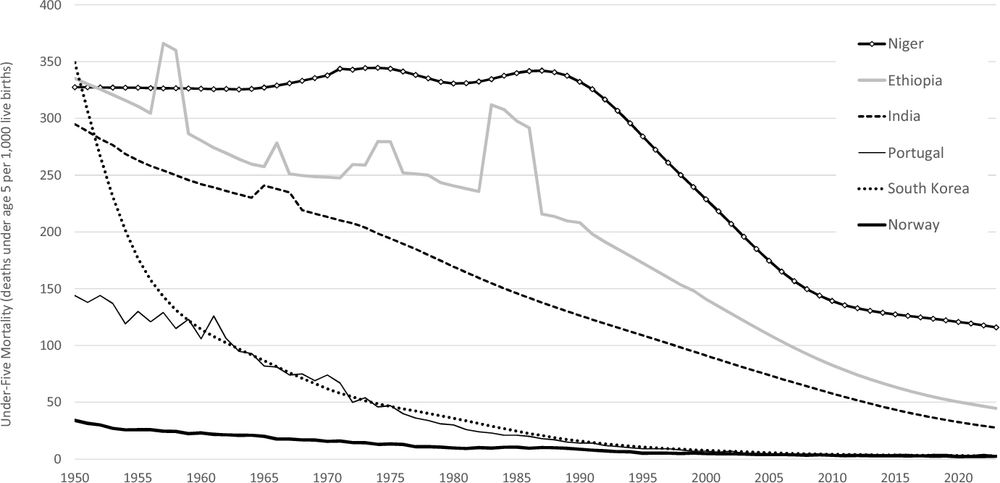
Andrew Fischer
@andrewmfischer.bsky.social
Prof at Institute of Social Studies, The Hague, Chair of Development and Change @devandchg.bsky.social, Canuck in Europe.
Working on development economics, demography & social policy, Tibet & western China. Wrote Poverty as Ideology (2018) & other stuff.
Working on development economics, demography & social policy, Tibet & western China. Wrote Poverty as Ideology (2018) & other stuff.
That’s also a problem in the recent wave of unequal exchange articles. I do not know how they get through peer review, except by being reviewed by people without technical expertise in the area.
November 8, 2025 at 8:14 AM
That’s also a problem in the recent wave of unequal exchange articles. I do not know how they get through peer review, except by being reviewed by people without technical expertise in the area.
Like, tucked deep into the article is a btw moment that was screaming for more attention: “A preliminary ruling at the High Court in London in December 2024 found that report had been ‘defamatory’.”
November 4, 2025 at 4:34 PM
Like, tucked deep into the article is a btw moment that was screaming for more attention: “A preliminary ruling at the High Court in London in December 2024 found that report had been ‘defamatory’.”
I think there is a lot of innuendo in this story that is not being said.
November 4, 2025 at 7:44 AM
I think there is a lot of innuendo in this story that is not being said.
MDPI alone probably publishes a good share of these…
October 19, 2025 at 11:36 AM
MDPI alone probably publishes a good share of these…
This trope has been the right wing go-to explanation for the unequal & dysfunctional US health care system for decades now. Fox was blowing this dog whistle during Obama’s attempts to reform, as far as I recall.
October 2, 2025 at 8:51 AM
This trope has been the right wing go-to explanation for the unequal & dysfunctional US health care system for decades now. Fox was blowing this dog whistle during Obama’s attempts to reform, as far as I recall.
You are doing fantastic work on this Saloni. I really appreciate your correctives to the population collapse panic.
October 2, 2025 at 8:39 AM
You are doing fantastic work on this Saloni. I really appreciate your correctives to the population collapse panic.
Indeed, through successive tweets, I am convinced that Elmo thinks that negative growth will result in something becoming exponentially negative, rather than just dwindling out slower and slower...
September 5, 2025 at 1:44 PM
Indeed, through successive tweets, I am convinced that Elmo thinks that negative growth will result in something becoming exponentially negative, rather than just dwindling out slower and slower...
My thoughts exactly.
Also, besides all the other questions with the simple correlations in the FT piece, what if the interpretation is actually the opposite? If having kids makes people more conservative? Then the opposite conclusion follows (just to say how silly it is as an argument).
Also, besides all the other questions with the simple correlations in the FT piece, what if the interpretation is actually the opposite? If having kids makes people more conservative? Then the opposite conclusion follows (just to say how silly it is as an argument).
August 30, 2025 at 3:47 PM
My thoughts exactly.
Also, besides all the other questions with the simple correlations in the FT piece, what if the interpretation is actually the opposite? If having kids makes people more conservative? Then the opposite conclusion follows (just to say how silly it is as an argument).
Also, besides all the other questions with the simple correlations in the FT piece, what if the interpretation is actually the opposite? If having kids makes people more conservative? Then the opposite conclusion follows (just to say how silly it is as an argument).
We know. And the rest of our trade is actually in deficit with the US.
August 16, 2025 at 2:54 PM
We know. And the rest of our trade is actually in deficit with the US.
As far as I can tell, Japan and South Korea are way ahead of China in per capita terms. Even Germany is ahead. Just the US is behind among those top five.
July 19, 2025 at 9:14 PM
As far as I can tell, Japan and South Korea are way ahead of China in per capita terms. Even Germany is ahead. Just the US is behind among those top five.
Yes, the “this is the biggest crisis of the century” crowd annoys the heck out of me. The worst is that it plays into far right Elmo politics.
July 15, 2025 at 6:27 PM
Yes, the “this is the biggest crisis of the century” crowd annoys the heck out of me. The worst is that it plays into far right Elmo politics.
Good to know. It is just that you cited econ dev and cultural contagion as the reasons, and I thought you were citing the article.
July 15, 2025 at 2:51 PM
Good to know. It is just that you cited econ dev and cultural contagion as the reasons, and I thought you were citing the article.
I really wish economists would read demographers, realise that they have been showing & saying this for decades, but that it is not fundamentally due to econ dev, but to mortality.
My latest short commentary on this: link.springer.com/article/10.1...
My latest short commentary on this: link.springer.com/article/10.1...

A Demographic Case for a Global South Focus in Development Studies - The European Journal of Development Research
Although demographic transitions across the Global South have been progressing towards what might be considered as convergence with the Global North, an understanding of this core socio-structural tra...
link.springer.com
July 15, 2025 at 2:31 PM
I really wish economists would read demographers, realise that they have been showing & saying this for decades, but that it is not fundamentally due to econ dev, but to mortality.
My latest short commentary on this: link.springer.com/article/10.1...
My latest short commentary on this: link.springer.com/article/10.1...
I meant that social scientists often complain about the 2 yr IF, that it is biased towards medical & physical sci where things get cited much faster after they are pub’ed. So, there is a pref for the 5-yr bc it gives more time for getting cited. But I find it makes almost no diff to the rankings.
June 28, 2025 at 12:50 PM
I meant that social scientists often complain about the 2 yr IF, that it is biased towards medical & physical sci where things get cited much faster after they are pub’ed. So, there is a pref for the 5-yr bc it gives more time for getting cited. But I find it makes almost no diff to the rankings.
The logic is that it takes longer to get cited in social sciences than in medicine or physical sciences, hence the 5-yr IF is supposed to better capture that.
So, they are averages of sorts, but of very narrow and specific date ranges.
So, they are averages of sorts, but of very narrow and specific date ranges.
June 27, 2025 at 12:43 PM
The logic is that it takes longer to get cited in social sciences than in medicine or physical sciences, hence the 5-yr IF is supposed to better capture that.
So, they are averages of sorts, but of very narrow and specific date ranges.
So, they are averages of sorts, but of very narrow and specific date ranges.
No, the standard JIF is literally: all cites in 2024 (only from other WoS listed journals) of articles published in 2022-23 / # of those articles.
The 5-yr IF is cites in 2024 of articles from 2019-23 / # of those articles.
So both are citations in only one year, but of different date ranges.
The 5-yr IF is cites in 2024 of articles from 2019-23 / # of those articles.
So both are citations in only one year, but of different date ranges.
June 27, 2025 at 12:43 PM
No, the standard JIF is literally: all cites in 2024 (only from other WoS listed journals) of articles published in 2022-23 / # of those articles.
The 5-yr IF is cites in 2024 of articles from 2019-23 / # of those articles.
So both are citations in only one year, but of different date ranges.
The 5-yr IF is cites in 2024 of articles from 2019-23 / # of those articles.
So both are citations in only one year, but of different date ranges.
Although your explanatory note at the bottom isn’t very precise & gives the impression it is all citations, rather than just citations in one year.
2-year JIF is specifically citations in 2024 to articles published in 2022 & 2023. 5-yr to articles published from 2019-23.
2-year JIF is specifically citations in 2024 to articles published in 2022 & 2023. 5-yr to articles published from 2019-23.
June 26, 2025 at 3:47 PM
Although your explanatory note at the bottom isn’t very precise & gives the impression it is all citations, rather than just citations in one year.
2-year JIF is specifically citations in 2024 to articles published in 2022 & 2023. 5-yr to articles published from 2019-23.
2-year JIF is specifically citations in 2024 to articles published in 2022 & 2023. 5-yr to articles published from 2019-23.

